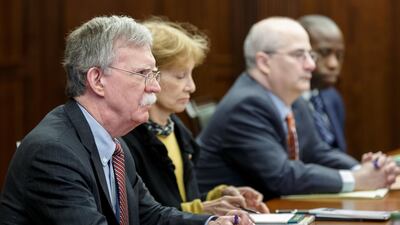The Trump administration's announcement that it is withdrawing from a key Cold War-era missile treaty has prompted predictable howls of protest from the Kremlin.
The Intermediate-range Nuclear Forces Treaty signed by Ronald Reagan and his Soviet opposite number, Mikhael Gorbachev, is regarded as one of the lasting achievements of the age of detente, helping to achieve a massive reduction in the number of nuclear-armed, medium range, nuclear warheads that threatened the globe.
About 2,700 ground-based ballistic missiles were scrapped with the implementation of the agreement, which banned the deployment of missiles with a range of between 500 and 2,500 kilometres by both the US and the Soviets, thereby helping to ease tensions between the two superpowers and ultimately resulting in the collapse of the Iron Curtain.
But with Russian President Vladimir Putin intent on rebuilding Russia's military strength, concerns have been growing in Washington that the Russians have been violating the treaty, and working on the development of a new generation of land-based missiles that threatens to alter significantly the military balance of power in Europe.
Furthermore, the Pentagon believes that if Russia is allowed to get away with flagrant violations of the treaty, this will encourage the likes of China and Iran to work on development of new weapons systems of their own.
It is these concerns that have now prompted US President Donald Trump to announce he is cancelling the INF, which he argues puts his country at a major disadvantage with other rival powers.
And the White House is threatening to allow the Pentagon to commence work on a new generation of land-based missiles of its own, unless a revised version of the treaty can be negotiated. Unlike the 1987 agreement, which was a bilateral arrangement between Washington and Moscow, the Trump administration is now seeking a broader treaty, one that includes both Russia and China.
Mr Trump's move has already drawn heavy criticism from the Kremlin. Mr Gorbachev, the last remaining signatory to the original agreement, said America's withdrawal would represent a major blow to global arms control efforts while Mr Putin warned that the American move was "very dangerous" and that, if it went ahead, "there would be nothing left except an arms race". The Russian leader has also warned that Moscow would respond to any move by Washington to deploy new weapons systems into Europe.
The Russians, though, will have only themselves to blame if the White House follows through on its threat to scrap the 1987 agreement.
Suspicions that Moscow was violating the treaty first surfaced in 2014 when then US president Barack Obama raised concerns about the range of Russia's new land-based Novator 9M729 missile, or SSC-8, to give it its Nato classification.
But, as was so often the case with Mr Obama's handling of global security issues, he was reluctant to threaten the Russians over the breach, believing that simply by raising Washington's concerns, he could persuade them to change their conduct.
Moreover, Moscow has denied that the new missile breaches the treaty, claiming its range falls well below the 500km threshold stipulated in the agreement.
Moscow's protestations of innocence, though, have been greeted with deep scepticism in Washington, particularly after satellite intelligence reports showed the Russians had deployed a missile battalion to the Russian province of Ekaterinburg in the Urals this summer.
Even the notably cautious head of Nato, secretary general Jens Stoltenberg, has weighed into the controversy, warning that Russia "had probably violated the deal".
The big question now is whether, following Mr Trump's dramatic decision to cancel the agreement, the president's action has the desired effect and persuades the Kremlin to take the issue seriously.
This week's visit to Moscow by John Bolton, Mr Trump's hawkish national security adviser and a long-standing advocate to tearing up the agreement, should certainly help to concentrate minds.
But the bigger issue is whether Washington has any chance of broadening the treaty's scope to include other powers which are also producing similar weaponry, such as China.
China's military build-up is a major headache for the Pentagon, which views Beijing's emerging military strength as radically changing the power balance in Asia. The ability to deploy land-based ballistic nuclear-armed missiles would significantly enhance China's ability to threaten the region.
Washington will also want any new arrangement to apply to rogue states like Iran, which continue to work on new missile systems capable of delivering nuclear warheads.
Iran has taken advantage of the Syrian conflict to test its missile technology, most recently firing a volley of missiles at alleged terrorist positions, following the recent attack on the Ahvaz military base.
This action, together with Iranian missile strikes against Kurdish positions, has reinforced Washington's determination to bring Iran to heel when the new round of sanctions are imposed next month as part of the Trump administration's decision to withdraw from the 2015 nuclear deal.
If the concept of arms control is to have any relevance to the modern age, then it must place the same restraints on rogue states like Iran as it does major powers like Russia, China and the US.
Con Coughlin is the Daily Telegraph's defence and foreign affairs editor
__________________
Get stories like this on in your inbox each morning. Sign up for our daily newsletter here



